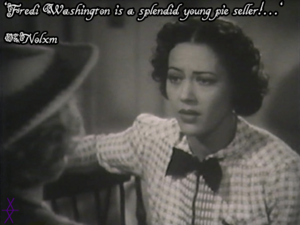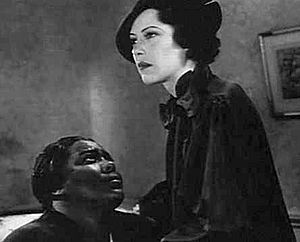Fredi Washington facts for kids
Quick facts for kids
Fredi Washington
|
|
|---|---|

Washington in Imitation of Life, 1934
|
|
| Born |
Fredericka Carolyn Washington
December 23, 1903 Savannah, Georgia, U.S.
|
| Died | June 28, 1994 (aged 90) Stamford, Connecticut, U.S.
|
| Occupation | Actress, activist |
| Years active | 1922–50 |
| Spouse(s) | Lawrence Brown (1933–51; divorced) Hugh Bell (1952–70, his death) |
Fredericka Carolyn "Fredi" Washington (December 23, 1903 – June 28, 1994) was an American actress and activist. She worked in theater and movies. Fredi was also a performer and a writer.
She was one of the first people of color to become famous in films and on stage. This was during the 1920s and 1930s. Fredi Washington was part of the Harlem Renaissance. This was a time when black artists and writers created amazing work.
Her most famous role was Peola in the 1934 movie Imitation of Life. In the film, she played a young woman with light skin who chose to live as a white person. After 1937, she left Hollywood. She went back to New York to work in theater and fight for civil rights.
Contents
Early Life and Family
Fredi Washington was born in 1903 in Savannah, Georgia. Her father, Robert T. Washington, worked for the postal service. Her mother, Harriet "Hattie" Walker Ward, was a dancer. Both of Fredi's parents had African-American and European family.
Fredi was the second of five children. Her mother died when Fredi was 11 years old. As the oldest girl, Fredi helped raise her younger siblings. Their grandmother also helped. Fredi and her sister Isabel went to a school for black girls near Philadelphia.
Later, her family moved to Harlem, New York. This was during the "Great Migration". Many African Americans moved north for better lives. Fredi finished high school in New York City.
Acting and Entertainment Career
Starting in Entertainment
Fredi Washington began her career in 1921. She was a chorus girl in a Broadway musical called Shuffle Along. Dancer Josephine Baker hired her for a cabaret group. Josephine Baker became a good friend and helped Fredi a lot.
A producer named Lee Shubert discovered Fredi. In 1926, she got a big role on Broadway. She starred with Paul Robeson in the play Black Boy. Fredi quickly became a popular dancer. She toured around the world with her dance partner, Al Moiret.
First Movie Roles
In the late 1920s, Fredi started acting in movies. Her first film was Black and Tan (1929). She played a dancer who was dying. She also had a small part in The Emperor Jones (1933). In 1934, she played Cab Calloway's girlfriend in a musical short film.
Imitation of Life Role
Her most famous role was in the 1934 movie Imitation of Life. Fredi played a light-skinned black woman. This character chose to pass as white. This meant she pretended to be white. She did this to get more chances in a society that had strict rules about race.
Because Fredi had light skin and features, the role was perfect for her. But it also meant filmmakers often gave her similar roles. People sometimes thought Fredi herself might have passed as white in real life. Fredi said in 1934 that the role was just acting. She felt it was a compliment if she made the character seem real.

In 1949, she told reporters that she was proud to be black. She said, "you don't have to be white to be good." She spent her life proving this to others. Imitation of Life was nominated for an Academy Award. Years later, Time magazine called it one of "The 25 Most Important Films on Race."
Activism and Later Work
Fighting for Civil Rights
Fredi Washington's experiences in movies and theater made her a civil rights activist. She wanted to help other black actors find more roles. In 1937, she helped start the Negro Actors Guild of America (NAG). Other founders included Noble Sissle and Paul Robeson.
This group worked against unfair stereotypes. They wanted more different kinds of roles for black actors. Fredi Washington was the first executive secretary of the organization.
Leaving Hollywood for Radio
Fredi Washington appeared in the 1937 film One Mile from Heaven. She played a biracial woman who claimed to be the mother of a white baby. Even though critics liked her work, she found it hard to get many roles in Hollywood. Black actresses were often expected to have dark skin. They were usually cast as maids.
Also, movie rules at the time made it hard. They did not allow showing romantic relationships between white and black characters. So, Hollywood directors did not offer Fredi romantic roles. One critic said she was "too beautiful and not dark enough to play maids, but rather too light to act in all-black movies."
Fredi had a role in a 1943 radio show. But there were not many regular radio shows for black actors. Fredi wrote that radio seemed to keep its "doors sealed" against black artists.
In 1945, she said she was a "mighty proud gal." She believed no one should lie about their background. She said she did not agree with the "stupid theory of white supremacy." She would not hide being black for money or any other reason.
Working as a Writer
Fredi Washington also wrote for the theater. She was the entertainment editor for People's Voice. This was a newspaper for African Americans. It was started by Adam Clayton Powell, Jr.. He was a minister and politician. He was married to Fredi's sister, Isabel Washington Powell.
Fredi spoke out strongly against racism. She worked with Walter Francis White, who was the president of the NAACP. They worked together to fix problems facing black people in America.
Personal Life
In 1933, Fredi married Lawrence Brown. He played the trombone in Duke Ellington's jazz band. They later divorced. In 1952, Fredi Washington married Hugh Anthony Bell. He was a dentist. She then moved to Greenwich, Connecticut.
She was a very religious Catholic.
Death
Fredi Washington Bell died on June 28, 1994. She was 90 years old. She passed away from pneumonia after having several strokes. This happened at St. Joseph Medical Center in Stamford, Connecticut.
Legacy and Honors
- In 1975, Fredi Washington was honored. She was put into the Black Filmmakers Hall of Fame.
- In 1979, she received the CIRCA Award. This was for her lifetime achievements in performing arts.
- In 1981, she got an award from AUDELCO. This group helps African-American theater in New York.
Filmography
- Black and Tan (1929)
- The Emperor Jones (1933)
- Imitation of Life (1934)
- Ouanga (1936)
- One Mile from Heaven (1937)
See also
 In Spanish: Fredi Washington para niños
In Spanish: Fredi Washington para niños
 | Precious Adams |
 | Lauren Anderson |
 | Janet Collins |

